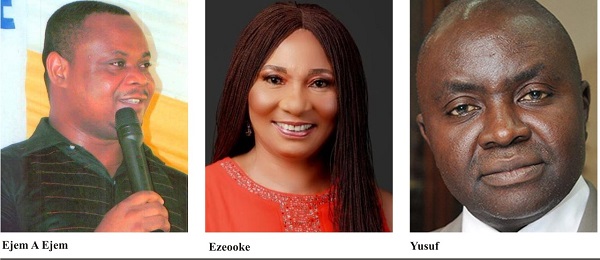Auto Policy: Is The FG Planning A Reverse?
As a result of the economic challenges in Nigeria and the dire need to generate as much revenue as possible for the nation whilst improving the general standard of living of the citizens, some concerned stakeholders have advocated for a shift in the nation’s auto policy, but coming as some others are thanking God for opportunity to venture into new businesses.
a result of the economic challenges in Nigeria and the dire need to generate as much revenue as possible for the nation whilst improving the general standard of living of the citizens, some concerned stakeholders have advocated for a shift in the nation’s auto policy, but coming as some others are thanking God for opportunity to venture into new businesses.
The National Automotive Policy was part of Federal Government’s response to the seeming uncontrolled influx of substandard vehicles into the country as the Government believes that the influx of such vehicles contributes significantly in depleting the nation’s scarce foreign exchange.
However, despite government’s effort to reduce import of used vehicles into the country through its auto policy, new vehicles still suffer patronage compared to ‘tokunbo’ vehicles and the impact of the Auto policy has led to the diversion of car-carrying vessels to neighbouring West African ports as a result of high duty tariff on the vehicles in Nigeria. The policy stipulates that imported new vehicles must pay 70 per cent duty, a move that was opposed by shippers and agents.
Several automobile assembling plants have also emerged, such as the Japan duo; Yamaha and Panasonic, but the production of locally assembled cars as well as the patronage remains very low.
The Auto policy is said to have led to the reduction of the maritime workforce by about 70%, which affects mostly licensed customs agents, importers, dealers and Nigerians abroad and subsequently, the reduction of activities by 70% in the operation of Terminal operators who are to pay Federal Government based on cargo throughput earnings and shipping companies, which has drastically affected their activities and may result in the retrenchment of staff any time from now.
The issue has also led to massive smuggling due to the high demand of such ‘tokunbo’ vehicles in the country, as a result of the non-availability of domestic production, while the few vehicles locally assembled are sold at exorbitant fees.
In a report sent to MMS Plus, the factional President of National Council of Managing Directors of Licensed Customs Agents (NCMDLCA), Mr. Lucky Amiwero lamented that the cost of purchasing vehicles in the country continues to increase due to the increase in tariff ranging from 5%, 10%, 20% and 35% depending on the cubic capacity to 35%- 70% on almost every imported vehicle.
According to Amiwero, there is a need to look at the gap in the auto policy, stressing that with the ECOWAS Common External Tariff (CET); there should be uniform tariffs between Ghana and Nigeria due to developmental priorities within the Sub- region.
He also noted that the World Trade Organization’s (WTO) obligation on tariff reduction and Local content should be observed as it relates to Nigeria’s Tariff 35% and Levy 35% (70%).
Amiwero stressed that the unavailability of locally made vehicles for Nigerian market and the fate of the former Assembling plants built in the 80s and 90s ought to be studied to ascertain the reason for their closure as the scenario may repeat itself with Auto policy.
“The 35% Tariff increase without corresponding development of local assembly plant increases only creates few beneficiaries of massive import. What is the cost of the Nigerian made vehicle, is it affordable to the common man?” Amiwero queried.
However, the Director General of National Automotive Council (NAC) Aminu Jalal affirmed that the importation of vehicles in the country had reduced; he attributed this to the present forex challenges.
Aminu Jalal told MMS Plus that since the devaluation of the naira about two years ago importers have not been getting the substantial value of their imports, thus it led to drastic reduction in the volume of imports.
“The vehicles coming into the country has reduced, but it is not only vehicles. Imports generally have reduced and those complaining cannot just pick vehicles and say its being diverted to Cotonou. How about several other items whose import have also drastically reduced, are they also diverted to Cototnou?
According to Jalal, the auto policy doesn’t need any restructuring as he believes that the policy guarantees industrialization, employment and an avenue for the government to diversify the economy.
“Recently, NAC held a stakeholders meeting in Lagos and at that meeting everyone agreed that the policy should remain. The policy is geared towards developing the nation’s economy via industrialization. We want to diversify the economy so that the current challenges such as forex would no longer happen because the nation would have several sources of revenue” he said.
Jalal noted that there were several locally assembled cars in country and he maintained that Nigerians should be concerned with the prospects of manufacturing and assembling vehicles and exporting to neighbouring countries like Cameroon and Chad.
With the multifaceted problems facing the power sector, one can only ponder how the assembling plants would be able to produce vehicles that can be affordable for domestic market, competitive and exportable, considering the cost of production especially if they are to run on diesel most of the time.
Meanwhile, the CEO of Mulifelong motors, Mrs. Mulikat Fehintola maintains that the future of the automobile industry in Nigeria is very bright.
According to her, the nation is about to start exploring the sector, “By the time we start fully, it is going to be a different scenario and the story will be different because we wouldn’t only be producing for the Nigerian market. We are also looking at the prospects of exporting these vehicles too”
Mulikat is concluding plans to introduce a new brand of made in Nigeria vehicles ‘Mulifelong motors’.
Reacting to the high cost of locally assembled vehicles, Mulikat stressed that Nigerians should also consider the quality as well as the factors that increase the cost of producing in the country.
A look at the Pakistani government and its auto-policy can provide a viable approach for Nigeria. With the hope of attracting European carmaker, the Pakistan government approved a new automobile policy which offers tax incentives to new entrants to help them establish manufacturing units and compete effectively with the three well-entrenched assemblers.
After a hiatus of almost two and a half years, the Economic Coordination Committee (ECC) of the cabinet gave the go-ahead to the Automotive Development Policy 2016-21.
However, the government did not change its policy for used car imports, leaving consumers with a narrow range of choice until new brands of good quality are produced in the domestic market. The Federal Board of Revenue had proposed that import of up to five-year-old used cars should be allowed compared to the current three-year ceiling. It also called for opening imports for commercial purposes.
At a stakeholders’ forum last week in Lagos, the Minister of Industry, Trade and Investment, Dr. Okechukwu Enelamah, promised that the Federal Government would review the policy, but did not say the areas the review will cover. However, MMS Plus later gathered that he simply made a political statement, because the promised review has no reference and negates the policy thrust of the present regime.
The effects on the huge revenue loss to the Nigerian government, private sector on the massive diversion of car-carrying vessels and the number of unemployment the policy has created is alarming. The incentives that are tailored to benefit few through massive importation of Fully Built Units (FBU) also contravene the global automotive standards.
By Kenneth Jukpor








